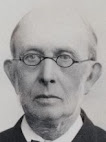 |
| Pastor Oskar Schabert |
Literature.
Martyrs. The Suffering of the Baltic Christians. By Pastor O. Schabert, St. Gertrude's Church, Riga. Agency of the Rauhen Haus, Hamburg 26. 77 pages. M.4.
“The martyrdom of the Baltic Christians is portrayed in a deeply moving manner by an eyewitness who himself was tried and tested in martyrdom. A warning sign for us Germans! [And us Americans!] A gem of rare value in form and content”,
is how the publisher characterizes this booklet. In a review we read:
“We have martyrs again in the midst of the old ‘Christianity’, Evangelical-Lutheran martyrs, in the 20th century. This realization awakens Psalms of praise in our hearts when we read Shabert's writing, in the midst of the shivering over the nameless sufferings that have befallen our brothers and sisters on the Baltic Sea shore. Despite the great apostasy of Western Christianity, there is still a Christianity that stands not in words but in power, and our beloved Lutheran Church has been honored to reveal such power.”
In short, powerful lines the author describes how Lutheranism gained a firm foothold in the Baltic countries a few years after the posting of the theses [Luther’s 95 Theses], first among the Germans, but then also among the Latvians and Estonians. In one generation the arch-Catholic country had become Evangelical. But when it became a robbery by the Poles, the first persecution by the Jesuits began, who sought to eradicate, by root and branch, the “cursed Lutheran heresy” from the old “Land of Mary”. A few congregations fell away, but most of them declared with H. Samson: “We want to stay with the pure word of God as long as there is still a breath in us.”
Gustavus Adolphus [of Sweden] brought freedom to the Baltics in 1620, but in 1721 they came under the forced rule of the Russians. Apostasy from the Russian state church and the admission of apostates to the Lutheran Church were punished as criminal offenses, while “orthodox” propaganda among the Lutherans was zealously pursued and promoted by the state. But woe to the Lutheran pastors who welcomed back repentant apostate Lutherans! Schabert writes:
“Whether absolutist tsarism, whether constitutional monarchy, whether democratic-socialist republic, whether Bolshevism reigns, however different they find, they find one thing in the pursuit of the Gospel.” [now American democracy?]
Under [Konstantin] Pobedonostsev the persecution of tsarism reached its peak. England also had its hand in this. Schabert remarks:
“It is now clear from the records that the leading [Russian] newspaper Novoye Vremya worked with English money, envying everything German and Evangelical. The slanders had their effect. This was clearly shown at the outbreak of the world war.”
But the persecutions under the tsars had not harmed the Lutheran Church. Before the war, Livonia had 144, Courland 103 [western Latvia], Estonia 56 parishes with about 300 pastors and 2,000,000 Evangelicals. The most serious suffering was caused by the revolution in 1917, when the rabble reigned instead of the tsar. Of the 18 pastors sent to Siberia, none was allowed to return to their congregations. The Bolsheviks deported 400 Germans, Latvians (page 210) and Estonians to Siberia as hostages.
= = = = = = = = = = = = Continued in Part 2 = = = = = = = = = =This booklet was reprinted numerous times and, commenting on the 1930 reprint, the journal Archiv für Religionspsychologie / Archive for the Psychology of Religion, Vol. 5 (1930), p. 363, said (translated):
"The booklet describes a memorable period of Baltic church history (1919), based on the strong religious life of the persecution period. It has long since found its way to the people."




No comments:
Post a Comment
Comments only accepted when directly related to the post.